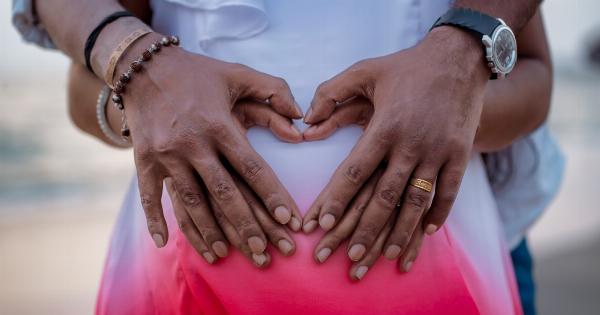Iron deficiency anemia is a common condition that affects many pregnant women. It occurs when the body does not have enough iron to produce sufficient red blood cells, leading to reduced oxygen supply to both the mother and the developing baby.
Managing iron deficiency anemia during pregnancy is crucial to ensure the health and well-being of both the mother and the child. In this article, we will discuss the causes, symptoms, and the importance of early diagnosis and treatment of iron deficiency anemia during pregnancy.
Causes of Iron Deficiency Anemia During Pregnancy
Iron deficiency anemia in pregnancy can be caused by a variety of factors. One of the main reasons is the increased demand for iron as the pregnancy progresses.
The developing fetus requires a significant amount of iron to support its growth and development. If the mother’s iron stores are already depleted, it becomes challenging to meet this increased demand.
Other common causes of iron deficiency anemia during pregnancy include inadequate iron intake through diet, poor absorption of iron from food sources, and excessive blood loss during childbirth or due to other pregnancy-related complications.
Women who have had multiple pregnancies close together or who had iron deficiency anemia in previous pregnancies are also at higher risk.
Symptoms of Iron Deficiency Anemia During Pregnancy
Many women with iron deficiency anemia during pregnancy may not experience any symptoms initially. As the condition progresses, however, the following symptoms may become more apparent:.
1. Fatigue and weakness.
2. Shortness of breath.
3. Rapid heartbeat.
4. Pale skin, nails, and lips.
5. Dizziness or fainting.
6. Headaches.
7. Cold hands and feet.
8. Cravings for non-food items like ice or dirt (pica).
It is important to note that these symptoms can also be attributed to other pregnancy-related issues, so it is crucial to consult a healthcare professional for a proper diagnosis.
Diagnosing Iron Deficiency Anemia
Diagnosing iron deficiency anemia during pregnancy involves a series of tests to evaluate the mother’s iron levels. The most common test is a complete blood count (CBC), which measures the amount of hemoglobin and red blood cells in the blood.
If the results indicate low hemoglobin levels, further tests such as serum ferritin levels and iron-binding capacity may be conducted.
In some cases, additional tests, such as a peripheral blood smear or bone marrow biopsy, may be done to rule out other potential causes of anemia and to determine the appropriate treatment.
The Importance of Managing Iron Deficiency Anemia
Effective management of iron deficiency anemia during pregnancy is vital for both the mother and the baby.
If left untreated, iron deficiency anemia can lead to serious complications, such as preterm delivery, low birth weight, and developmental delays in the baby.
For the mother, iron deficiency anemia can increase the risk of postpartum complications and make it more challenging to recover after childbirth.
It can also affect the mother’s overall well-being, leading to fatigue, lack of energy, and reduced ability to perform daily tasks.
Treating Iron Deficiency Anemia During Pregnancy
The treatment for iron deficiency anemia during pregnancy involves iron supplementation to replenish the body’s iron stores. Iron supplements are available in various forms, including tablets, capsules, and liquid supplements.
It is important to take these supplements as prescribed by a healthcare professional and to follow their recommendations closely.
In addition to iron supplementation, it is crucial to focus on a balanced diet that includes iron-rich foods. Good dietary sources of iron include red meat, poultry, fish, leafy green vegetables, dried fruits, and fortified cereals.
Pairing iron-rich foods with vitamin C-rich foods can enhance iron absorption.
Preventing Iron Deficiency Anemia During Pregnancy
Prevention is always better than cure. To reduce the risk of developing iron deficiency anemia during pregnancy, it is important to focus on maintaining adequate iron levels even before conceiving.
This can be achieved by consuming a well-balanced diet that includes iron-rich foods.
During pregnancy, it is recommended to have regular check-ups with a healthcare professional who can monitor iron levels and provide necessary guidance.
Prenatal vitamins, which often contain iron, may also be prescribed to ensure sufficient nutritional intake.
In cases where iron deficiency anemia is persistent or severe, the healthcare provider may recommend additional tests to identify any underlying causes, such as gastrointestinal disorders, that may be affecting iron absorption.
In such cases, targeted treatment and management plans will be devised accordingly.
Lifestyle Considerations
Managing iron deficiency anemia during pregnancy is not limited to supplementation and dietary changes. Several lifestyle considerations can also support the management of this condition:.
1. Rest and proper sleep: Fatigue is a common symptom of iron deficiency anemia. Getting sufficient rest and sleep can help combat fatigue and restore energy levels.
2. Gentle exercise: Engaging in moderate exercise, such as prenatal yoga or walking, can help improve blood circulation and boost overall well-being.
3. Stress reduction: High levels of stress can exacerbate symptoms of iron deficiency anemia. Practicing relaxation techniques, such as deep breathing exercises or meditation, can be beneficial.
4. Adequate hydration: Staying hydrated is important for maintaining overall health and optimizing iron absorption.
Conclusion
Managing iron deficiency anemia during pregnancy is crucial for the health and well-being of both the mother and the baby. Early diagnosis, proper treatment, and lifestyle considerations can help mitigate the risks associated with this condition.
By following healthcare professional’s guidance, maintaining a balanced diet, and taking prescribed iron supplements, pregnant women can ensure a healthy pregnancy and promote optimal development for their baby.





























